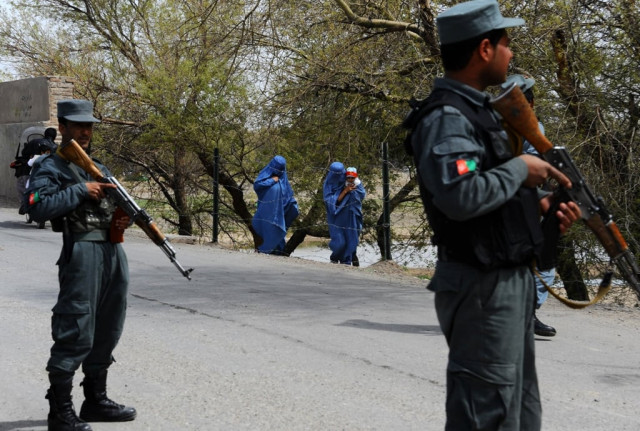Taliban suicide blast kills six policemen as Afghan elections loom
Kabul has undergone several attacks in the run-up to elections, the first democratic handover of power in Afghanistan

Afghan policemen stand guard as residents walk along a street on the outskirts of the northwestern city of Herat. PHOTO: AFP
The attack came as the three leading candidates to succeed President Hamid Karzai made a final push for votes with rallies on the last day of campaigning.
Kabul has been rocked by a string of high-profile attacks in the run-up to Saturday's election, which will be the first democratic handover of power in Afghanistan's turbulent history.
"The suicide attacker wearing a military uniform detonated himself near the gate of the ministry killing six policemen," interior ministry spokesperson Sediq Sediqqi told AFP.
He said that the blast occurred in an annex to the ministry, which is one of the most closely-guarded buildings in the Afghan capital.
"The explosion shook my shop. I saw a column of smoke coming out of the ministry," shopkeeper Rahim Gul told AFP.
"Around 10 minutes later an ambulance rushed in and came out quickly from the ministry."
A diplomat in the Indian embassy, which is next door to the ministry, told AFP he heard a huge bang and that he and his colleagues were ordered to shelter in reinforced safe rooms.
The Taliban claimed responsibility for the attack through one of their recognised Twitter accounts.
Landmark poll
In February 2012 two US military advisers were shot dead at the interior ministry during a wave of anti-Western unrest.
The election is seen as a benchmark of progress since the Taliban were ousted from power in 2001, and the militants have urged their fighters to target polling staff, voters and security forces.
On Saturday, the Kabul headquarters of the Independent Election Commission (IEC) was attacked when five Taliban militants occupied a nearby building and unleashed rockets and gunfire at the fortified compound.
All five attackers were killed by Afghan security forces six hours after the attack began, and there were no other casualties.
Another IEC centre, Kabul's most prestigious hotel and a guesthouse run by a US anti-landmine charity have also been targeted in recent weeks.
Former World Bank economist Ashraf Ghani, Abdullah Abdullah, runner-up in 2009, and former foreign minister Zalmai Rassoul are the leading contenders in the eight-man race.
A repeat of the bloodshed and fraud that marred the 2009 election would damage claims by international donors that the multi-billion-dollar 13-year intervention in Afghanistan has made progress in establishing a functioning state system.
The Afghan government has pledged to ensure a safe election, with more than 60,000 troops deployed along with police to provide security, though the Nato military coalition has said it will assist if necessary.
Despite warning two weeks ago that security would have a "major impact" on the Afghan polls, the United Nations (UN) envoy to Kabul Jan Kubis struck an upbeat note on Wednesday.
He said this year's election was "much better prepared, including on the side of security, technical preparations, fraud mitigation and prevention measures".
"The votes of people who will come to the elections will not be wasted," Kubis told reporters.
"This time the conditions are better, this time it is possible and necessary to use the opportunity and go and vote."
Several international organisations have scaled down their election monitoring activities in Afghanistan, leading to fears that a lack of independent oversight could heighten the risk of fraud.
But Kubis said an "avalanche" of domestic observers including party agents and media would help combat rigging.
Whoever wins the race to succeed Karzai faces a testing time maintaining stability as Afghan forces take on the fight against the resilient Taliban insurgency without the aid of Nato forces.
The US-led coalition is due to withdraw its 53,000 combat troops from Afghanistan by the end of the year.



















COMMENTS
Comments are moderated and generally will be posted if they are on-topic and not abusive.
For more information, please see our Comments FAQ